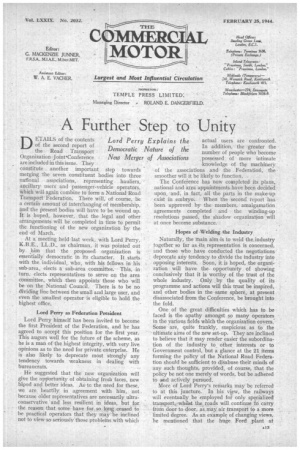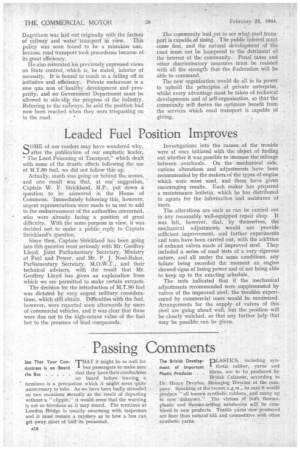A Further Step to Unity
Page 15

Page 16

If you've noticed an error in this article please click here to report it so we can fix it.
DBTAILS of the contents of the second report of the Road Transport Organization .JoinVConference New are included in this issue. They constitute. another important step towards merging the seven constituent bodies into three national associations, representing hauliers, ancillary usersand passenger-vehicle operators, which will again combine to form a National Road Transport Federation. There will, of course, be a certain amount of interchanging of membership, and the present bodies will have to be wound up. It is .hoped, however, that the legal and other arrangements will be completed in time to permit the functioning of the new organization by the end of March.
At a meeting held last week, with Lord Perry, K.B.E., LL.D., as chairman, it was pointed out by him that the proposed organization is essentially democratic in its character. It starts with the individual, who, with his fellows in his sub-area, elects a sub-area committee. This, in turn, elects representatives to serve on the area committee,, which then appoints those who will be on the National Council. There is to be no dividing line between the small and large user, and even the smallest operator is eligible to hold the highest office.
Lord Perry as Federation President Lord Perry himself has been invited to become the first President of the Federation, and he has agreed to accept this position for the first year. This augurs well for the future of the scheme, as he is a man of the highest integrity, with very live opinions as to the need for private enterprise. He is also likely to deprecate most strongly any tendency towards weakness in dealing with bureaucrats.
He suggested that the new organization will give the opportunity of obtaining fresh faces, new bleod and better ideas. As-to the need for these, we are heartily in agreement with him, not , because older representatives are necessarily ultraconservative and less resilient in ideas, but for the reason that some have for so long ceased to be practical operators that they may be inclined not to view so seriously those probleins with which actual users are confronted. In addition, the greater the number of people who become'. of Associations possessed of more intimate knowledge of the machinery of the associations and the Federation, the . smoother will it be likely to function. , The Confeience has now completed its plans, national and area appointments have been decided upon, -and, in fact, all the parts in the make-up exist in embryo. When the second report has been approved by the members, amalgamation agreements completed and the winding-up resolutions passed, the shadow organization will at once become substance.
Hopes of Welding the Industry Naturally, the Main aim is to weld theindustry together so far as -its representation is concerned, and those who have conducted the negotiations deprecate any tendency to divide the industry into opposing interests. Soon, it is hoped, the organiza.tion will have the. opportunity of showing conclusively that it is worthy of the trust of the whole industry. Only by the quality of its programme and actions will this trust be inspired, and other bodies in the same sphere, at present disassociated from the Conference, be brought into the fold.
One of the great difficulties which has to be faced is the apathy amongst so many operators in the various fields which the organization covers: Some are, quite frankly, suspicious as to the ultimate aims of the new set-up. They are inclined to believe that it may render easier the subordination of the industry to other, interests or to Government control, but a glance at the 21 items forming the policy of the National Road Federation should be sufficient to disabuse their minds of any such thoughts, provided, of course, that the policy be not one merely of words, but be adhered to atid actively pursued.
More of Lord Perry's rernarks may be referred to at this juncture. In his view, the railways will eventually be employed for only specialized transport, whilst the roads will continue to carry from door to door; as may air transport to a more limited degree. As an example of changing views, be mentioned that the huge Ford plant at Dagenham was laid out originally with the factors of railway and water transport in view. This policy was soon found to be a mistaken one, because road transport took precedence because of its great efficiency.
He also reiterated his previously expressed views on State control, which is, he stated, inferior of necessity. It is bound to result in a falling off in initiative and efficiency. Private endeavour is a sine qua non of healthy development and prosperity, and no Government Department must be allowed to side-slip the progress of the industry. Referring to the rail!,vays, he said the position had now been reached when they were trespassing on to the road. The community had yet to see what road transport is capable of doing. The public interest must come first, and the natural development of the road must not be hampered to the detriment of the interest of the community. Penal taxes and other discriminatory measures must be resisted with all the strength that the Federation will 1De able to command.
The new organization would do all in its power to uphold the principles of private enterprise, whilst every advantage must be taken of teChnical developments and of self-organization, so that the community will derive the optimum benefit from the services Which road transport is capable of giving.




















































